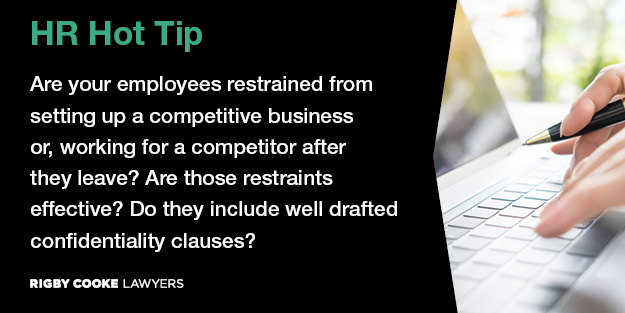Welcome to our series of HR interviews with Lawyer Monika Nosal who answers some of the most common questions asked by HR managers regarding employees’ legal entitlements.
Restraint of trade clauses are commonly included in employment contracts with the intention that they protect an employer’s business interests by restraining an employee’s activities after they have left employment. These clauses are often found in executive or senior employee’s employment contracts.
The most common restraint of trade clauses are:
- Non-compete clauses: to prevent a former employee from establishing a competing business or from working for a competitor.
- Non-solicitation/poaching clauses: to prevent a former employee from approaching or soliciting customers and clients of the business or inducing other employees to leave the business.
- Confidentiality clauses: to protect the employer’s trade secrets and other confidential information.
It is important for employers to regularly review the efficacy of such clauses. This is particularly relevant where an employee has been promoted or there has been a change in the nature of the business.
In doing so, employers must keep in mind that restraint of trade clauses are only enforceable to the extent that the restraint is reasonably necessary to protect the employer’s legitimate business interests.
Establishing reasonableness involves proving that:
- the employer has a legitimate business interest to protect (for example, a trade secret); and
- the scope of the restraint is no wider than is reasonably necessary to protect that interest.
When determining whether a restraint is reasonable in its scope, the courts will consider the following:
- the duration of the restraint;
- the geographical area in which it is to have effect; and
- the activities that it purports to control.
If the restraint goes beyond what is reasonably necessary to protect a legitimate business interest, a court will not enforce it.
Therefore, while well drafted restraint of trade clauses can be an effective tool in protecting an employer’s business interest, employers must exercise caution when drafting these clauses to ensure that they are effective and enforceable.
Employers obligations under the National Employment Standards, modern awards, enterprise agreements and contracts can be complex, overlapping, and at times confusing.
Employers need to familiarise themselves with and understand their legal obligations to avoid any possible claims by employees (both existing and former) and unsuccessful job applicants, as well as prosecution by the Fair Work Ombudsman. Under the accessorial liability provisions of the Fair Work Act 2009 (Cth), employers and individuals such as directors and HR managers can be personally held accountable for breaching workplace laws in certain circumstances.
A HR Legal Audit conducted by Rigby Cooke can provide the HR function and, in turn, provide employers with comfort in knowing that they are legally compliant, or at least provide advance warning of any potential compliancy issues before they become problematic.
| Disclaimer: This publication contains comments of a general nature only and is provided as an information service. It is not intended to be relied upon as, nor is it a substitute for specific professional advice. No responsibility can be accepted by Rigby Cooke Lawyers or the authors for loss occasioned to any person doing anything as a result of any material in this publication.
Liability limited by a scheme approved under Professional Standards Legislation. ©2021 Rigby Cooke Lawyers |

